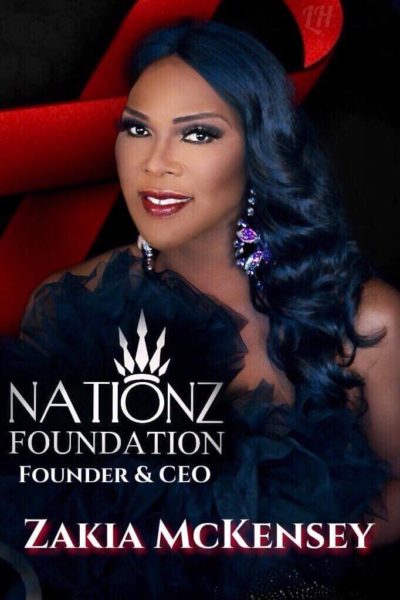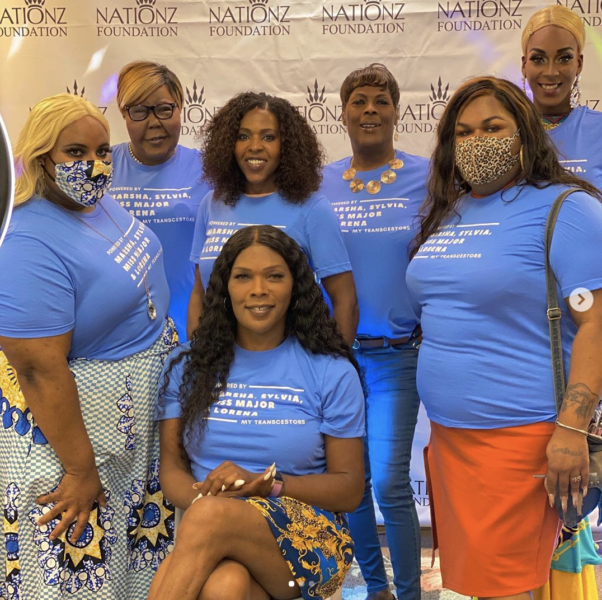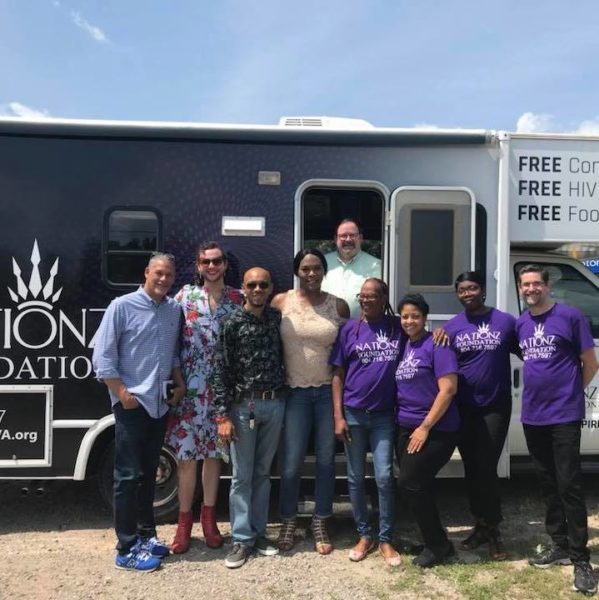 Whether she’s competing in a beauty pageant or working to build a nonprofit from the ground up, Zakia McKensey is in a league of her own. As a healthcare educator, activist and performer, McKensey has one overarching goal: To give back to her community and assist those who are unable to help themselves. In an effort to help those within her own community, she launched her own nonprofit organization in 2015, the Nationz Foundation. Her organization uniquely works to care for those in the community at risk of or affected by HIV/AIDS, while showcasing the talents of Richmond’s LGBTQ performing artists. Having been motivated by a close friend contracting HIV almost 20 years ago, McKensey decided to educate herself and become active in this work so that she can help others who might be struggling.
Whether she’s competing in a beauty pageant or working to build a nonprofit from the ground up, Zakia McKensey is in a league of her own. As a healthcare educator, activist and performer, McKensey has one overarching goal: To give back to her community and assist those who are unable to help themselves. In an effort to help those within her own community, she launched her own nonprofit organization in 2015, the Nationz Foundation. Her organization uniquely works to care for those in the community at risk of or affected by HIV/AIDS, while showcasing the talents of Richmond’s LGBTQ performing artists. Having been motivated by a close friend contracting HIV almost 20 years ago, McKensey decided to educate herself and become active in this work so that she can help others who might be struggling.
During the same year she started Nationz Foundation, McKensey and her cousin, Duane Williams launched an annual pageant at Diversity Richmond. Through the creation of their pageant, they were able to deliver prevention education and link people to a range of essential services. Funds raised from the event went toward prevention and relief efforts, including a toy drive for patients in the Children’s Hospital’s Pediatric HIV/AIDS unit.
No matter what McKensey is doing – whether it’s performing or serving as a healthcare educator, she is willing to go above and beyond to help those in her community. With HIV impacting communities of color and LGBTQ individuals at a higher risk than other communities, she knows that her work is pivotal in making influential change.
In this conversation with healthcare educator, activist and performer, Zakia McKensey, the Campaign for Southern Equality team spoke with Zakia about how she and Nationz Foundation had to adapt in the early months of the coronavirus pandemic, her thoughts regarding the intersection of racial equality and Pride month, advice she has for LGBTQ folks and how she takes care of herself as a leader. Take a look!
CSE: Let’s start off with how you’re doing – it’s been an unprecedented year in so many ways. How have you been grappling with it?
ZAKIA: It’s been a heavy year. There’s so much heaviness, trying to make decisions about things that I never, ever would have thought I’d need to make decisions about – from COVID to George Floyd to riots to protests.
At Nationz Foundation, we’ve never closed during the pandemic; we’ve been open the entire time. I put in some measures to keep my staff safe, keep the clients that we serve safe. We’ve shifted our hours a bit, but we brought folks back in mid June, and we’ve shifted the office around so that we could be spaced out.
We’re only taking appointments at the time, requiring folks to have a mask – and if they don’t have one, we have additional masks for our clients. We’ve made our budgets really flexible so we could spend on PPE and meet our community in unique ways. We have shields, face masks, face shields, and the system that we put in place has been working well.
From early on, we were able to take our mobile units out, and those provide us access to so many people who don’t have transportation to us. For our food pantry services, we’ve started to ship items to folks – or people can call us, and we’ll take the box outside and put them in the trunk for them.
We’ve always had virtual platforms in our groups, so we could meet folks who were not already in our area. So in some ways we had a really seamless transition into what was going on with the pandemic.
CSE: How have your clients reacted to the pandemic?
 ZAKIA: There were a lot of concerns from folks about losing their jobs and unemployment taking so long to process – especially such a marginalized community that doesn’t have a lot of social support. We had a lot of girls who came in person, others sort of fell off because they didn’t want to be online and missed that in-person connection.
ZAKIA: There were a lot of concerns from folks about losing their jobs and unemployment taking so long to process – especially such a marginalized community that doesn’t have a lot of social support. We had a lot of girls who came in person, others sort of fell off because they didn’t want to be online and missed that in-person connection.
We also had folks who had transportation issues prior to the pandemic, and so the virtual spaces we had were actually more beneficial to them – early on, the number in the online group actually exceeded the number of in-person clients.
There’s been a great need for food, utility bills, Internet and cable bills. Beyond that, our programming has shifted things to more squarely address the needs provoked by the pandemic. We have VAVP – Virginia Anti-Violence Project – coming in to do programming weekly. We have a program that specifically addresses HIV education, learning effective communication styles, learning all of this programming that we do online.
It’s just a lot of trying to figure out how to shift things to a safer environment and navigate things.
CSE: In early June, the country really engaged in a deeper and fuller conversation than ever before about racial injustice and police brutality. That conversation coincided with the start of LGBTQ Pride Month – do you have any reflections on the intersections of those two discussions?
ZAKIA: I want to get folks to change the conversation around “All Lives Matter” to “Black Lives Matter” – all folks who are black. The movement was designed to build toward a future where people have economic, social power.
I think a lot about how my community – my Black, African-American community – is often very divided based on the way that people identify. There still is a hesitancy or prejudice about folks who are LGBTQ. But if all Black Lives Matter, there shouldn’t have to be a debate about me relinquishing my trans identity because I need to make a choice about being Black first. All of those are parts of me. I am a Black trans woman. People are lesbian, gay, bisexual. And at the end of the day, regardless of how we identify, we should all be included. We still deal with the same oppression. We deal with the systematic structures that hold us down, and it’s even more compiled when we identify on the LGBTQ spectrum.
I hope that as folks push and move forward with the Black Lives Matter movement that they understand that all people, no matter what their skin color is, no one should be getting killed. But specifically when we’re already a community that is being oppressed and are dealing with so much – you can’t sit there and protest the killing of Black men and then not talk about Black trans women are being killed.
Folks need to find acceptance and accountability for their own actions. They need to stop perpetuating this same violence that is already being perpetuated against our own community. You may not like how I’m living my life, but am I mistreating you? Am I being disrespectful to you? We need to love more, hate less, and come together.
CSE: Do you have any advice for LGBTQ folks on who want to celebrate Pride even as we join in the #BlackLivesMatter protests?
I think we should still celebrate Pride Month. We need to celebrate things that are good, especially when there’s so much going on.
I also encourage folks to be safe, keep up with the social distance. We want to be able to celebrate many more Prides together, especially when this pandemic is taking folks out of here.
Let’s be creative and find different ways to show your Pride.
And I can’t stress enough the importance of voting. All elections are important, but this is especially important. If you are a felon and can get your rights restored, get them restored. If you can vote, vote. If you need to get registered, get registered. People need to value the strength and the importance of your voice.
When people’s voices are not heard, we can’t make change.
All elections are important, but this is especially important. People need to value the strength and the importance of your voice. When people’s voices are not heard, we can’t make change.” – Zakia McKensey

CSE: Grassroots LGBTQ leaders in the South often deal with a lot and have to shoulder significant burdens. How do you take care of yourself as a leader?
ZAKIA: I believe that you can lead a horse to the water, but you can’t make them drink it. So when the day is over, when it’s 5:00 or 6:00 or whatever time your day ends, you need to let it end. You need to take time to recharge, whatever that looks like for you.
For me, getting home, having a glass of wine, and letting my dog love on me and appreciate me – that’s what I need. I need to not take calls related to work.
That’s what I need. I need to recharge me so I can be better for the world.
In this field we talk about self care, self care, self care – and I often don’t do the best job at my own self care. I try very hard to do something for me and make me happy. And I don’t know what that may look like for other people, but I encourage them to find it.
Have a moment to be sure you can recharge. Do something that makes you feel good. Buy something that makes you feel happy that you deserve. As organizers, as case managers, as advocates, leaders, we give so much of ourselves, and we forget that we need to give to ourselves. Pour 20% into yourself of what you pour into the community and we’ll be able to keep going for longer and making the world better.
As organizers, as case managers, as advocates, leaders, we give so much of ourselves, and we forget that we need to give to ourselves. Pour 20% into yourself of what you pour into the community and we’ll be able to keep going for longer and making the world better.” – Zakia McKensey

